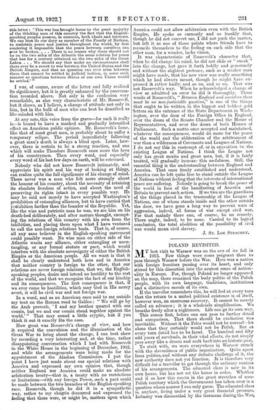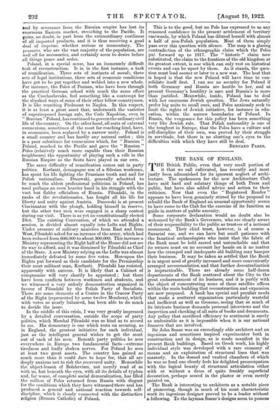POLAND REVISITED.
MY last visit to Warsaw was on the eve of its fall in 1915. Few things were more poignant than to pass through Warsaw before the War. Here was a nation with foreign frontiers passing over its heart, and only stirred by this dissection into the acutest sense of nation- ality in Europe. For, though Poland no longer appeared on the map, there remained the body politic of the Polish people, with its own language, traditions, institutions and a distinctive morale of its own.
1f the traveller remembers this, he will feel at every turn that the return to a united political existence is of itself, however won, an enormous recovery. It cannot be merely called an advance ; it is a wholesale simplification. We breathe freely after a nightmare. Life can go its own way. This comes first, before one can pass to further detail and comparison. That there should be exaltation was inevitable. Without it the Poles would not be normal—let alone that they certainly would not be Polish. But at every turn detail has to be faced. The hundred and fifty odd years of servitude, in their vital effects, do not simply pass away like a dream and melt back into an historic past. To start with, we were everywhere in Warsaw struck with the slovenliness of public organization. Quite apart from politics, and without any definite challenge of it, the new authority does not yet function. It is therefore very difficult for a traveller to get through the ordinary routine of his arrangements. The educated class is now in its own house, but has not set the house in order. Whether and if so how this reacts in the great stretches of non- Polish territory which the Government has taken over is a question whose answer I can only guess. The educated class is, anyhow, living under a very great financial pressure. Industry was dismantled by the Germans during the War, and by severance from the Russian empire has lost its enormous Eastern market, stretching to the Pacific. It gains, no doubt, in part from the extraordinary costliness of all imported products, and it is thus receiving a good deal of impetus, whether serious or momentary. The peasants, who are the vast majority of the population, are well off for necessaries, and certainly seem to desire before all things peace and order. Poland, in a special sense, has an immensely difficult task of reconstruction. It is, in the first instance, a task of reunification. Three sets of instincts of morale, three sets of legal institutions, three sets of economic conditions have got to be put together and welded into a new whole. For instance, the Poles of Poznan, who have been through the practical German school with much the same effect as the Czechoslovaks, feel something like a contempt for the slipshod ways of some of their other fellow-countrymen. It is like reuniting Piedmont to Naples. In this respect, it is at least a great asset that, underneath the varieties of superimposed foreign rule, the Code Napoleon, even in " Russian " Poland, has continued to govern the ordinary civil life of the country. On the other hand, all sorts of external connexions, sometimes of the most far-reaching kind, have, in economics, been replaced by a narrow unity. Poland is a small country and has hardly any natural outlet ; this is a poor substitute for connexions which, for " Russian " Poland, reached to the Pacific and gave the " Russian " Poles (relatively much more capable than their Russian neighbours) the opportunity of playing such a role in the Russian Empire as the Scots have played in our own.
The same difficulty of reunification comes out in party politics. Korfanti, demagogue son of a Silesian workman, has spent his life fighting the Prussians tooth and nail for Polish nationalism. Dmowski, generally admitted to be much the ablest professional politician in Poland, has used perhaps an even heavier hand in his struggle with the vast but flabby officialism of Russia. Pilsudski, in the ranks of the revolutionaries, has fought all his life for liberty and unity against Austria. Dmowski is at present Cincinnatus with the plough, holding himself in reserve, but the other two men were engaged in a sharp contest during our visit. There is as yet no constitutionally elected Diet. The existing Convention, of which we attended a session, is divided almost equally into Lefts and Rights.
Under pressure of military anxieties from East and from West, Pilsudski asked for an increase of the army, which had been reduced from 600,000 to about 300,000. This increase a Ministry representing the Right half of the House did not see its way to afford, and it was dismissed by Pilsudski as Chief of the State. A new Ministry relying on the Lefts was almost immediately defeated by some five votes. Hereupon the Rights put forward as their candidate for the Premiership their most militant man, Korfanti. Pilsudski has resisted, apparently with success. It is likely that a Cabinet of compromise will very shortly be appointed ; but there have been conflicts between workmen and students, and we witnessed a very orderly demonstration organized in favour of Pilsudski by the Polish Party of Socialists. There are some elements of a Centre in the Cracow Party of the Right (represented by some twelve Members), which with votes so nearly balanced, has been able to do much to decide the issue. - In the middle of this crisis, I was very greatly impressed by a detailed conversation, outside the scope of party politics, which Marshal Pilsudski was so kind as to accord to me. His democracy is one which rests on securing, as in England, the greatest initiative for each individual, just as the intelligent general wishes to get the most out of each of his men. Beneath party politics he sees everywhere in Europe two fundamental facts—extreme tiredness and badly shaken nerves. For Poland he sees at least two great assets. The country has gained so much more than it could dare to hope for, that all are deeply anxious not to risk the recovered unity. Meanwhile the object-lesson of Bolshevism, not merely read of as with us, but beneath the eyes, with all its details of typhus and, far worse, of complete social demoralization, has filled the million of Poles returned from Russia with disgust for the conditions which they have witnessed there and has produced a general and national reaction towards self- discipline, which is closely connected with the distinctive religion (Roman Catholic) of Poland. This is to the good, but no Pole has expressed to us any reasoned confidence in the present settlement of territory eastwards, by which Poland has diluted herself with almost a half of non-Polish population. Most of them simply pass over this question with silence. The map is a glaring contradiction of the ethnographic claim which the Poles put forward up to 1917. The " historic " claim now substituted, the claim to the frontiers of the old kingdom at its greatest extent, is one which can only rest on historical events and can be upset by them. As it stands, the ques- tion must lead sooner or later-to a new war. The best that is hoped is that the new Poland will have time to con- solidate itself first. I can see no security for Poland if both Germany and Russia are hostile to her, and at present Germany's hostility is sure and Russia's is more than justified. Meanwhile, inside, Poland has to deal with her enormous Jewish question. The Jews naturally prefer big units to small ones, and Poles anxiously seek to limit the rights of Jewish initiative, for instance in edu- cation, within the narrow boundaries of Poland. In Russia, the vengeance for this policy has been something very like Jewish rule. That Polish nationality is one of the toughest in Europe, that the Poles have a culture and sell-discipline of their own, was proved by their struggle in servitude, but there is no shutting one's eyes to the difficulties with which they have still to deal.
BERNARD PARES.



































 Previous page
Previous page